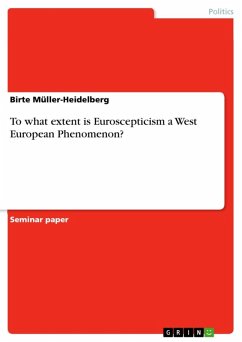Seminar paper from the year 2003 in the subject Politics - International Politics - Topic: European Union, grade: B, University of Bath (European Studies and Modern Languages), language: English, abstract: [...] This essay will show however that Euroscepticism is not a purely Western phenomenon. By taking a closer look at the latest Eurobarometer surveys (chapter 2) and then examining possible reasons for an upcoming Euroscepticism in the candidate countries (chapter 3), mainly focussing on Poland and the Czech Republic, the conclusion will try to differentiate between the form of Euroscepticism found in the Western states that already are members of the Union and the countries in the East that will join in May 2004 or are still negotiating. In the following analysis, a distinction between hard and soft Euroscepticism will be made. The former, also called principled Euroscepticism, encompasses outright rejection of the EU integration project and is in opposition to the respective country's joining or staying in the Union. The latter, frequently termed contingent Euroscepticism as well, can be either concerning the policies (overall support of EU integration but critical to the transfer of power to a European level in certain areas) or the national interest (defending the national interest while supporting the overall integration). While hard Euroscepticism would not allow any European integration, soft Euroscepticism remains "compatible with the spirit of the EU project" because it's qualified rather than absolute and therefore resolvable through negotiations.7 Hard Euroscepticism is hardly found at all; even the British do not really want to leave the European Union and could therefore be classified as soft Eurosceptics.8 Although there is research on the fields of party-based Euroscepticism as well as Euroscepticism in public opinion, this essay will not explicitly differentiate between the two because they go hand in hand when analysing the question whether there is any Euroscepticism in Central and Eastern Europe at all. The obvious Euroscepticism in Western countries could be linked closely to the fact that they have been members of the Union for quite a long time by now. [...] 7 Lees, 2002, 250 8 Baker, 2003, 237
Dieser Download kann aus rechtlichen Gründen nur mit Rechnungsadresse in A, B, BG, CY, CZ, D, DK, EW, E, FIN, F, GR, HR, H, IRL, I, LT, L, LR, M, NL, PL, P, R, S, SLO, SK ausgeliefert werden.


